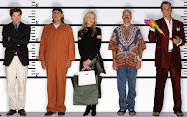Admittedly, these reviews are coming a bit late because, being the pennyless sitar player that I am, I've been waiting for movies to go to the dollar theater. I find that I'm less annoyed by movies if I only have to pay a buck for them. It's like the Fast Pass at Disney. Rides are always better when you don't have to wait in line.
 High School Musical 3:
High School Musical 3: Not that the plot of this movie matters,
High School Musical 3 follows the classless, raceless, sexuality-less troupe of well-behaved teens as they move through their senior year. The movie's bad. I mean, it's really,
really bad, but in an amazing way. The plot rings completely false and is borrowed from every other teen program
ever (namely a
Saved by the Bell episode where Zach and Kelly break up just because it's the end of the year and it makes
no sense), but the movie blatantly abuses the ridiculous rules of musicals, and somehow it works to their advantage. Because the plot doesn't matter and because all the characters are your typical ideological Disney archetypes, I'm not going to go into those boring details. Instead, I want to list the scenes that put this film on my Best-Worst Movies list.

5. Somehow, Troy (Zac Efron) is on the school's roof, and for some reason, there's a gazebo and a plethora of just-in-bloom flowers that make it an ideal setting for a duet with Gabriella (Vanessa Hudgeons). It's perfectly sunny outside, but during the middle of their duet, it starts raining. RAINING. Because what's more unpredictably romantic than dancing in the rain? You could certainly analyze this scene as the rain being a metaphor for bodily fluids (since the rain stops them from kissing, and Disney only allows for one kiss and it has to be at the end of the film), but I think it was just an excuse for getting Hudgeons and Efron wet.
4. After another sappy (and poorly written) duet in Troy's treehouse, Gabriella leaves his awkwardly blocked embrace to mock his treehouse toys. This is a beaming example of how horrible the acting and editing are. Efron has a future in acting, but Hudgeons should never be allowed to talk again.
3. Confused and angry over his breakup with Gabriella -- and the impending decision of choosing a college -- Troy goes to school (at night!) and dances in the hallways. You know this movie is awesome when the set begins to rotate and Troy dances on the ceiling. He's bruised and hurt, and I know this not because of Efron's amazing acting capabilities, but because it's lightening outside. This scene is fierce.
2. While in a salvage junkyard, Troy and his best friend Chad (Corbin Bleu) start dancing. And using tires as dancing props. It's like Jackie Chan and Bob Fosse collaborated on this gem. Not only do they dance, but they dance as if they're children who are pretending to be airplanes and ninjas and samurai. The dances are so ridiculous that you can't look away, and then Troy and Chad are turned into younger versions of themselves, your brain blows up.
1.
"Now or Never." This is a music video for a song from the movie, but it's the song itself that's unbelievable. No lie; I downloaded this song and listen to it every morning. Sixteen... sixteen...
Troy Bolton: Right now I can hardly breathe.
Gabriella Montez: Oh, you can do it just know that I believe.
Troy Bolton: And thats all I really need.
Gabriella Montez: Then come on!
Troy Bolton: Make me strong! It's time to turn it up. Game on!
'Nuff said.
 Appaloosa:
Appaloosa: I love Westerns. I really, honestly do, though I suppose I should say that I love the Western genre. I think it's unfortunate that Westerns hit the height of their popularity during an era of speedy production and underdeveloped technology. I love the themes of Westerns... juxtaposing the Old and New Worlds (nature vs. civilization), the code of the West (moral ambiguity and the hero), and the isolation of our loner hero. These concepts are still relevant today in our world of simulacra because we are on the brink of fully moving into the Post-Modern era. So although I love to engage with these themes, I prefer them in modern Westerns, like the remake of
3:10 to Yuma or
Brokeback Mountain -- and, for what it's worth, even
There Will Be Blood. Which is why it's so upsetting that
Appaloosa let me down.
Two unorthodox lawmen, Virgil (Ed Harris) and Everett (Viggo Mortenson), come to Appaloosa to fix the corrupt power Randall Bragg (Jeremy Irons) and his men have over the town. (Think
Shane, 2.0.) Unfortunately, this movie is less about Virgil and Everett's relationship and even less about Bragg. Instead, this movie focuses on one of the most unattractive performances from a female actress I've seen in a long time. Virgil is smitten by Mrs. French, played lazily and without any depth by Renée Zellwegger, a floating seductress who loves men in power. Instead of dealing with themes of isolation or morality, the main theme is Virgil's rocky affection for Mrs. French. She cheats on him (repeatedly), and he still stays with her anyway. Narratively, the story is fine. It's typical. The movie just didn't expound on the narrative in any engaging way. And Mortenson is thoroughly underutilized in this film.

Some things I liked: I love Ed Harris and Viggo Mortenson together. They have good chemistry, though I feel like their relationship could have been explored further. They have a backstory, but the movie doesn't go into that at all. There were no genuine struggles between them as friends or as law men, and it lacked the emotional pull that should have been there. When Mrs. French kisses Everett, what was I supposed to feel other than absolute hatred for this nondescript minx? And as far as taking-the-bad-guy-to-the-train sequence is concerned,
3:10 to Yuma does it so much better (though, to be fair, that comprises the entire plot of
3:10). And I love Jeremy Irons in almost everything I've seen him in. He, as well, was underutilized in this film. He wasn't a very scary bad guy, and he wasn't exactly on my radar as a difficult problem to solve. There were hints that he was influential and had connections, but they seemed to be convenient rather than elaborately orchestrated. When he escapes from capture, do I really care? I only saw him kill one man at the beginning of the movie, so it's not like he's a terror on the loose. In addition to these three actors (who all do well in their roles, despite lacking any development in the script), I also appreciated the look of the film. Directed by Ed Harris, the film is very beautiful. I didn't like the set very much, even if it's more realistic, because houses built on stilts just
looks like a set. But the saturation of color was welcomed and the location shots of the west were beautiful.
Some things I disliked (and in some cases loathed): The pacing was way off. It felt like nothing was happening for a majority of the film, but when I reflect back on it, I can recall specific scenes that moved the narrative forward. So how did this movie move forward without telling me? It's because it focused so much on Mrs. French. Once she was introduced, she was in nearly every scene. And all of those scenes were awful. Joining the company of Ben Stiller and Adam Sandler, I'm going to file Zellwegger as someone who should never make another movie. She was part of
Empire Records -- a glorious B-movie of epic nostalgia ("I don't feel that I need to explain my art to you, Warren.") -- but after that, nothing.
Jerry Maguire was good, but not because of her. Seriously, rewatch it. Her performance is grating and borderline obnoxious. And her performance in
Appaloosa lacks warmth, intelligence, or any remote definition of beauty that I have a hard time believing that any of these men would even care about her. Lastly, I was hoping for a moment of sacrifice or change, and I never got it. It was as if none of this ever happened. The only difference between the beginning of the movie and the end of the movie is that Bragg is no longer a threat. But these two men are still together (after a semi-comical show down where both of them are crawling on the ground after being shot), and there's no grand gesture of triumph. This film could have greatly improved from the death of Mrs. French...








































.jpg)

